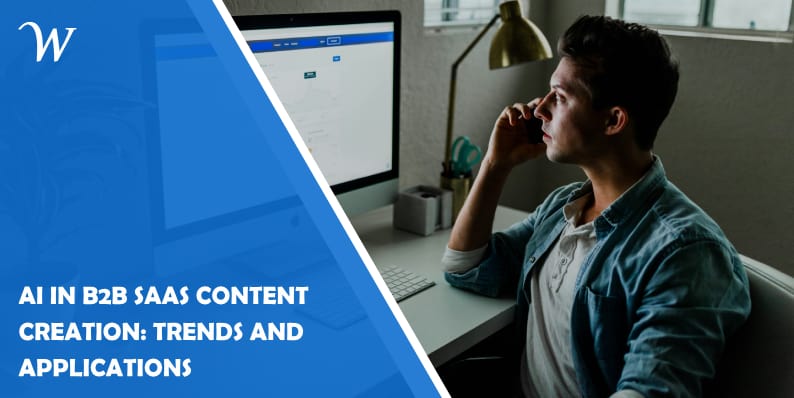In today’s evolving landscape, Artificial Intelligence (AI) is making waves across sectors, including business-to-business (B2B) software as a service (SaaS). Its capacity to sift through data sets and tackle tasks has truly transformed content creation. This article delves into the trends and applications of AI in B2B SaaS content generation, shedding light on how businesses can harness this technology to enhance their marketing endeavors.
1. The Impact of AI on Content Creation
AI has brought about enhancements in the efficiency and caliber of content marketing for SaaS. Rather than investing hours in research and writing, marketers now have access to tools that can craft lifelike content with minimal input. These AI-generated pieces serve as foundations for blog posts, social media updates, and product descriptions.
Nevertheless, it’s crucial to acknowledge that despite the advancements in AI algorithms, they still fall short of perfection. Machine-generated content often lacks the flair, diverse perspectives, and context-specific insights that human creators offer.
2. Crafting Content Strategies with AI
AI also plays a crucial role in formulating a B2B SaaS content strategy. By scrutinizing industry trends, customer inclinations, and competitor performances, AI-driven tools furnish marketers with insights.
By leveraging these insights, businesses can pinpoint the topics or formats for their intended audience. They can refine their content distribution strategies by selecting the channels to connect with potential customers.
3. Language Optimization
When it comes to language refinement, B2B SaaS companies should aim for concise communication in their content devoid of any details. AI technology plays a significant role in achieving this objective by offering improved alternatives during the writing process. By eliminating jargon and enhancing sentence structures for clarity and coherence, these tools ensure that the final content is polished and easily digestible for readers.
4. Audience Segmentation and Personalization
An additional benefit of incorporating AI into B2B SaaS content creation is its capacity to analyze user behaviors and preferences. Through AI-driven audience segmentation, companies can categorize their target audience into subgroups.
By tailoring content to address pain points, desires, and interests of customer segments, businesses can provide personalized experiences that resonate more effectively with potential clients. Furthermore, they can utilize AI-powered recommendation systems to propose content or products tailored to users, ultimately boosting engagement and conversion rates.
5. SEO Optimization
Enhancing SEO performance is essential for driving traffic within the realm of B2B SaaS companies. A SEO agencies for SaaS can help leverage AI-driven technology, which plays a significant role in examining search engine optimization (SEO) data and offering suggestions to enhance content.
These tools give insights into keyword usage, on-page optimization, backlink analysis, and competitor ranking strategies. Marketers can utilize data produced by AI algorithms to improve how their content appears in search results, making it more visible to customers.
6. Content Curation
Curating content is essential for establishing authority in B2B SaaS marketing. Traditionally, discovering articles from sources involves manually sifting through extensive information—a time-consuming task for marketers with busy schedules.
AI-powered tools now effortlessly curate articles based on specific topics or keywords specified by marketers. To cater better to the B2B audience, these tools eliminate less reputable sources—delivering curated content that enhances the brand’s credibility.
7. Social Media Automation
Engaging with audiences on social media platforms is crucial for B2B SaaS companies. Today’s AI technology streamlines this process by automating social media management tasks.
These tools enhance productivity by automatically scheduling posts at the times and analyzing real-time data to customize the messaging. They also manage customer inquiries using chatbots powered by Natural Language Processing (NLP). This automation not only saves time but also ensures consistent branding across different social media platforms.
8. Reflecting on Our Role in Content Creation
While AI provides benefits, it’s important to remember our responsibility as content creators. AI can help optimize content and improve efficiency, but should not completely replace the element of storytelling and building relationships.
B2B SaaS content is about establishing connections with target customers, educating them with materials, and fostering trust in one’s brand. By using AI, businesses can ensure their content is engaging while taking advantage of the speed and data insights offered by this technology.
Wrap Up
In today’s changing environment, incorporating AI into B2B SaaS content creation enables businesses to stay competitive and meet customers’ evolving expectations. AI-powered tools act as resources for refining language, personalizing content, boosting SEO strategies, simplifying social media management, and curating industry insights.
By using AI, B2B companies can enhance their marketing efforts. Position themselves as industry leaders. By combining AI-powered tools with the right knowledge, these firms can stay ahead in today’s marketing landscape.
- What Makes Onboarding Workflow Software Effective for New Hire Processes? - February 11, 2025
- The Best Tools for SEO Analysis and Optimization - July 31, 2024
- A Developer’s Guide to Multilingual Mobile App Testing - July 25, 2024
